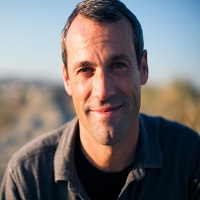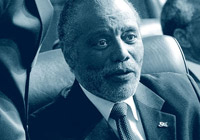“I GUESS YOU COULD SAY I’m playing Russian roulette.” My brother Tim was on the phone. It was several weeks into statewide shelter-in-place orders back in April. “I’m really taking a risk every day, and it feels like they’ve just sacrificed us.”
He was trying on a new identity, one that he didn’t choose for himself: “essential worker.” Tim is a supervisor at a busy L.A. branch of a major home improvement retailer, and he was getting nervous. A coworker had tested positive for coronavirus — someone he worked closely with — and other people were starting to stay home. He was continuing to work, despite available sick leave. I talked to him while he stood at the door, counting customers and making sure they wore masks. The line snaked out into the parking lot and down the street. “If this thing gets really bad and they have to shut down the store,” he wondered aloud, “where will I be then?”
Tim, three years my junior, is Black. I’m White. We have an older Black brother, an older White brother and a Black sister. A two-toned family forged by adoption made for a curious sight in our working-class neighborhood in Washington, D.C., during the ‘70s and ‘80s. We five siblings have taken divergent paths in the decades since. These days I work as the writer and editor for a Silicon Valley-based philanthropy. Tim’s past is checkered. He spent just shy of 13 years incarcerated for bank robbery. He was shuffled among federal prisons in Oregon, California, Louisiana, and Virginia, with roughly a year and a half of that in segregated housing: “solitary.”
Over the course of some eight weeks, as Tim and I talked on the phone regularly, we settled into and bumped up against the unfamiliar and uncertain reality of the new pandemic-impacted world we shared. As familiar and fatal acts of police brutality sparked an uprising for racial justice that swept the nation, I was reminded of the worlds we’ll never really share.
“I feel like I’m in prison!” During shelter-in- place, while I scrolled through social media, I had been reading comments like that from folks getting antsy with self-isolation and social distancing. As the weeks wore on, my daughter’s San Francisco public school closed its doors, and the streets emptied around me. I wondered how this moment looked through the eyes of someone who had truly known confinement.
Self-quarantine and “solitary” have very little in common. “I never told you the story of my first time in there, but I lost my mind,” Tim told me. He had been in solitary for months and began hearing voices within weeks. Convinced that eyes were watching him at all hours from the other side of his mirror, he covered it with toilet paper and plugged the vent. He would wake up gasping for breath. He watched the walls close in around him. “I’d smash my face up against that little window in the door so there was no way I could see the cell, so I wouldn’t feel like I was in that box,” he said. “You never recover from that.”
This was in the federal prison at Lompoc — the same place he met my daughter for the first time. Nami, not yet a year old, sat there on his knee smiling up at her uncle, his scarred and tattooed hands cradling her gently. “It felt like I was holding a little baby doll,” he remembered.
As our phone calls continued, Tim shared a sense of regret for squandered time. He wondered aloud: If he had worked harder and had not been a knucklehead, would he be living check-to-check now, putting his health on the line every time he punched a clock? Meanwhile, my work life had shifted entirely to Zoom calls, and I barely left the house. He and I were navigating the worsening pandemic in very different boats, and the layers of privilege separating me from Tim became glaring. Our family may have been a Carter-era vision of racial harmony, but it was not immune to the structural inequities at the bedrock of this country.
Tim thought about the guys he still knew in prison, where social distancing is impossible and medical resources are basic at best. “You never hear about what happens in prison,” he said. “People die in there all the time, and you won’t read about it in the papers.” He told me of savage beatdowns and indifferent stabbings for $50 debts. “There’s gonna be full-fledged riots if this thing gets out of control in there,” he said, fore- telling the outbreaks of the virus at San Quentin and other prisons during the months ahead.
By the beginning of May, the rumor mill at Tim’s job had kicked into high gear. At least 10 of his coworkers had tested positive for COVID-19. Check-cashing places near work had closed down, and he now had to go to liquor stores to get monthly money orders for his restitution payments. “There’s no app on your phone for that,” he said, laughing. His parole officer had been hounding him, saying he’d fallen behind. “Man, this is the best I’ve done in my whole life — the longest time I’ve had an honest paycheck — but they don’t let up,” he said. “Their job is to stand on your neck and see if you can handle the pressure.”
Three weeks later, a Minneapolis police officer killed George Floyd. In Los Angeles, protesters blocked the 101 Freeway, followed by citywide curfews that made getting home in time a challenge. Looting had gutted storefronts next to Tim’s place of work. He arrived at home one night to find his block splashed with lights from 10 police cars.
“Please don’t mess with me,” he thought, as he opened the gate to his building directly across the street. He texted me a photo of himself masked. “You used to get arrested if you looked like this,” he wrote. “Now you get a ticket if you don’t.”
As the protests gathered strength, so did Tim. He texted photos of himself and a friend stenciling George Floyd’s image on sheets of cardboard. The next night, the citywide curfew ended, and he joined thousands in the streets of downtown L.A. demanding justice. He hadn’t participated in a mass protest since the D.C. public schools closed for the Million Man March.
He lifted his sign and poured his heart into every call-and-response chant. Homeless people emerged from tents to join the throng, while loft dwellers leaned out their windows above, banging pots and pans and bellowing through bullhorns in solidarity.
“I said to Mom, ‘This must have been how Dad felt when he marched with Martin Luther King,’” Tim told me the next day. “I can’t vote or do any of that, so it made me feel alive — doing something to let people know how I feel. It was like I grew 10 feet and 200 pounds walking down those streets.”























